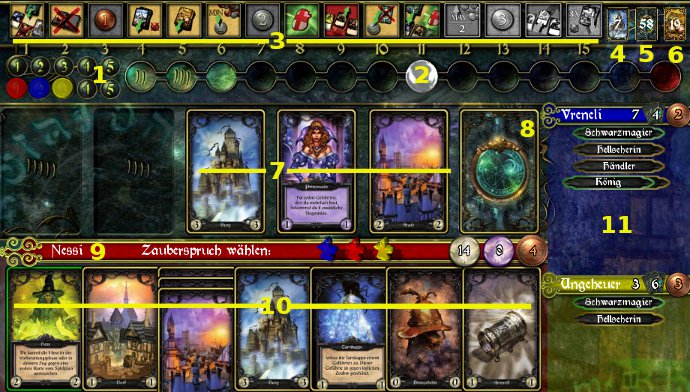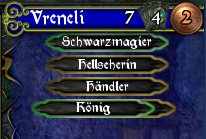Grimoria
Game information
Grimoria is a magical game that offers an easy introduction, but definitely has tactical potential for advanced players.
< p> 2 - 5 wizards fight for the throne in Grimoria. With the help of their magic spells and helpful companions, they try to collect as many magic points as possible in order to ultimately gain power over Grimoria.This rule mainly provides the controls for the online game. For any additional rule questions that arise, the original instructions can be consulted.
Tavolo di gioco

- Player order
- Round indicator
- Spells
- Discard pile (face up)
- Draw pile (face down)
- Treasure Card Stack
- Open Adventure Cards
- Covered Adventure Card
- Indicatore di Stato
- Own Adventure Cards (the ones since the last Round newly added cards are shown with a green border)
- Player display (detailed view via mouseover). Here too, the new cards are outlined in green.

The player name is on the left. In the middle it is shown which action the player currently has to complete. The current victory points are displayed on the far right. The number on the left represents the current number of points from cards laid out (excluding extra points from purple companions). The middle number shows the (own, current) victory points from purple companions and the number on the right stands for your own thaler supply.

In the overview of the opponents' player display you can see the opponents' companions listed. The new cards are displayed with a green border.
The numbers to the right of the name stand for the current number of points due to the cards laid out (without extra points due to purple companions), the number of cards drawn face down and the thaler supply.
Iniziamo a giocare
There are 87 adventure cards and in the game 28 treasure maps. Both are placed face down next to the game board. At the beginning of each round, one card of the adventure cards is laid out face up for each player. There is also a face-down card, so that there is one more card on display than the number of players participating.
The round indicator is placed on the corresponding field (4/5/6) depending on the number of players .
Each player receives one thaler starting capital.
Svolgimento
Grimoria takes place in several rounds, each of which consists of three phases:
- Spellbook phase
- Adventure phase
- Preparation phase
Spellbook phase
All players simultaneously (face down) select one of the spells (3) by clicking on it click the relevant field. Only the spells up to and including the white marker stone (2) can be selected; i.e. as the game progresses, the selection expands continuously, while at the beginning there are only a few spells available.
You can get an explanation of the individual spells via mouseover. The spells are explained in more detail on a separate page.
After all players have chosen a spell, the new player order is determined. To do this, you first look at which players are alone on a spell. Of these, the one who is furthest to the left, i.e. who has chosen the weakest spell, becomes first; the others (“single-seaters”) follow accordingly. Then we look for the remaining players who were not alone on a spell. The weakest spell is now counted first. The players involved now come behind the "lone players", whereby the order of the last round is decisive here.
Example:
Current order

In the spellbook phase, the following five spells were chosen:

Since Black is the only one sitting alone, he gets the 1st place. Of the "two-seaters", blue and green have the weakest spell, so they are taken into account first. Since Green was ahead of Blue in the last round (see above), Green is now on 2 and Blue on 3. This is followed by Yellow and Red, with Yellow being placed on 4 and Red on 5, since Yellow was also there in the previous round Red sat.
Adventure phase
According to the newly determined order, each player now does the work, starting with place 1, his spell first (most are done automatically). He can then draw one of the adventure cards that have been laid out. He can either take one of the open cards or the hidden card on the far right. The cards are not immediately refilled. So whoever comes last has little choice!
There are two types of adventure cards: buildings (hut, village, town, castle) and companions. The former simply bring victory points. The companions have certain characteristics that either provide advantages in the game (brown text field) or provide extra points for certain requirements at the end of the game (purple text field).
An explanation of the individual adventure cards is given via mouseover. They are explained in more detail on a separate page.
Preparation phase
Every player has a card chosen, the remaining card goes to the discard pile. As at the beginning, new cards are laid out again and the round indicator moves one position further to the right.
Fine del gioco
As soon as the round indicator reaches the red field on the far right, the last round begins. This is played through normally and then the game ends. Now the points are calculated:
- Each thaler brings 1 victory point
- Buildings and treasure cards (through magic spell 5) bring the printed victory point< /li>
- Companions bring the printed victory point number
- Companions with a purple text field bring extra victory points if the conditions for this are met
The player with the wins with the most victory points. If there is a tie, the number of thalers counts. If there is a tie here too, there are multiple winners.
To the Almanac of Spells, Companions and Treasure Cards.
Game-specific prop commands
Some game-specific prop commands are available for Grimoria:
Who after a few games If you no longer need the popping cards, you can switch them off with
Grimoria.CardPopup = off
. With "on" it is switched on again.
If you don't like the color distribution, you can change it as follows:
Grimoria.PlayerColor1 = 0000FF
The desired color must then be specified in the hex code for the corresponding player position. Here in the example, player 1 would then have blue instead of red.

